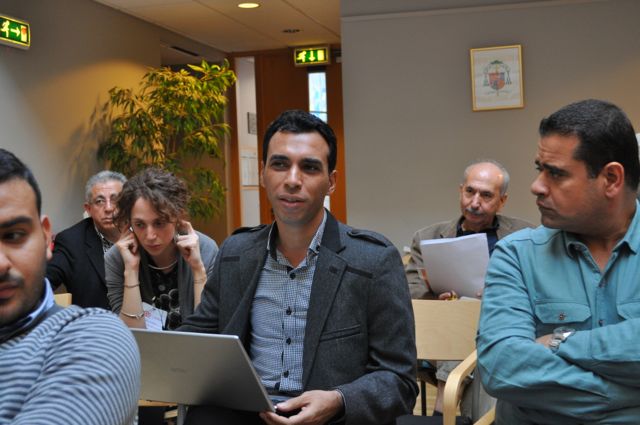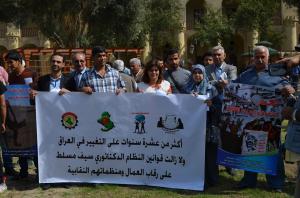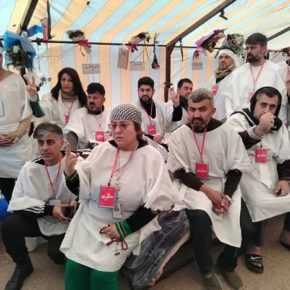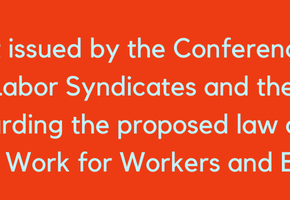Labor legislation in Iraq: between reality and the future
Wesam Chaseb Ouda
Iraq’s program Manager – Baghdad, International Solidarity Center
This document prepared for the ICSSI conference, Oslo , Norway – November 2014
Introduction
As we speak today, the labor legislation that was valid during the era of Saddam Hussein remains in effect. No fundamental changes have occurred, other than a minor adjustment by Paul Bremer, the US civic governor in Iraq. That amendment (on Iraqi labor law number 71 of 1987) took place soon after the US forces entered Iraq in 2003, and it was related to the articles of the law that regarded child labor.
The current labor legislation that is in effect in Iraq, and especially the labor law and the union organizing law (number 52 of 1987) conflict with several provisions of International labor conventions, mostly to do with the rights of collective bargaining, freedom of association in the public sector, and the right to strike. Moreover, there are many gaps and shortcomings in setting guidelines to resolve collective disputes in the workplace, representation of workers at any level: small factories, profession sector, or at the national level, all lack legal protection relating to acts of discrimination, harassment and are susceptible to forced labor.

Furthermore, the current law having to do with effective union organizing prohibits forming multiple labor federations, and restricts the right to a single labor organization. This is a violation of the ILO convention number 87 of 1948. Although Iraq has not ratified that convention it is a member of ILO, and thus it is committed to implementing the ILO declaration on Fundamental Principles and Rights at Work (1998), which consists of articles that guarantee the right to organize unions and the freedom engage in collective bargaining. Additionally, the union organizing law is in effect only in the private, mixed and cooperative sectors, and not in the public sector. This is a clear violation to the above-mentioned agreement.
The current status of law drafts, and the anticipated new amendments
In 2004, the Iraqi government drafted a new labor law which it discussed with all ‘social dialogue partners’. It was sent to the state’s “Shura” council, and then to the Council of Ministers where it was approved and forwarded to the parliament — a process that took several years. The parliamentarian labor committee started its work on the draft in 2012 and it presented it to the ‘social dialogue partners’ and a number of international organizations, including the ILO and the Solidarity Center, to contribute their opinions.
Based on the three technical memo’s of ILO, and the outcomes of meetings, workshops and seminars that were organized by the Solidarity Center which involved representatives from Iraqi unions, members of the Iraqi parliament, the Ministry of Labor and Social Affairs, the ILO and the ITUC, it was concluded that the draft that was prepared for voting had several significant gaps that required a thorough legal review. The parliamentary labor committee made some changes and adjustments, then voting took place on the first 46 articles of the law, in spite of the fact that not all amendments were added to the draft (that would have required re-submitting it to the government to start the review process again — and that would likely take a long time).
The groups already mentioned, together with complete cooperation from the parliamentary labor committee, succeeded in introducing important amendments to the draft that were not stated in law number 71, the labor law currently in effect. These include:
- Prohibiting the worst forms of child labor. According to the ILO convention No. 182 of 1999 (ratified by Iraq in 2001).
- Prohibiting direct and indirect discrimination in employment and occupation, as well as the search for job and training opportunities.
- Prohibiting the forced labor.
- Prohibiting the sexual harassment at work.
- Admitting the right to collective bargaining and the right to strike.
As for the trade unions law, two proposals were presented on the union organizing law, one was proposed by Iraqi trade unions with some technical support from International organizations, while the second was from the parliamentary labor committee.
The Iraqi trade union’s proposal was in line with international labor standards on union rights and freedoms, while the labor committee’s preliminary proposal had several contradictions with international labor standards. Given the contrast between the two proposals, the labor committee presented a third proposal that is very much compatible with the content of the union’s proposal, except that it did not mention the right to organize in the public sector, a crucial priority to Iraq unions, nor did it acknowledge the right to form more than one union. Iraqi unions and the parliamentary labor committee agreed, in the presence of representatives of the ILO, ITUC and the Solidarity Center, to accept the proposal in its initial form. Later it was presented for preliminary reading so as to obtain a law draft status prior to that, it was just a law proposal. After the first reading, a new condition was added ensuring the right of the union to organize in the public sector. The first reading took place in January, 2014, and the hope was to continue the collaboration between Iraqi trade unions and the parliamentary labour committee. However, the unstable political situation in Iraq has had an impact on the performance of the parliament: for several months, sessions were not conducted, and so it could not complete the project and vote on the new labor law.
In order to pass both a new labor law and a union organizing law that are compatible with international labour standards, Iraqi trade unions and the parliamentary labour committee need to continue their mutual collaboration, and must aim to address and fill all gaps in the proposed laws.
The legal priorities are:
- To review the 46 articles that were voted on by the Iraqi parliament, and all the other articles that are subject to vote; to make sure that they are in line with International labour standards and the three ILO memo’s that were sent to Iraqi government; to review the recommendations that emerged from the Solidarity Center’s meetings, seminars and workshops attended by Iraqi trade unions, Parliamentary committees, and International partners.
- To prevent the exclusion of any amendments that are compatible with international labour standards, especially those related to individual and collective work contracts, disputes about rights and benefits, and that the law includes clear procedures that are not open to foggy interpretations.
- To guarantee legal protection to all workers from unwarranted job termination, as well as from arbitrary layoffs, and also to clarify and define the role and authority of the job termination committee according to the law.
- To provide legal protection to workers who are employed by secondary companies that are sub-contracted by mother companies.
- To conduct a comprehensive legal review of the language of the articles in the law, as some can be interpreted in different ways and this variation may cause conflict among groups that are served by this law.
- To conduct a review of the union organizing law draft that was read before the Iraqi parliament, by relevant groups (unions and government); to present this law to the International Labor Organization for its opinion and suggestions of necessary amendments; and finally, to proceed with the second reading of the law during the first legislative semester of the parliament.
- To inform and show the unions the final draft of the pension and social security laws so they can give their opinions prior to their prevention for reading and voting at the Iraqi parliament.
- To urge the Iraqi council of ministers to approve the proposal which ratifies the ILO convention number 87 of 1948 which is related to union freedoms and protects the right of organizing; and then to refer this proposal to the parliament for voting.
Next steps: The Need for International Solidarity
The concerted efforts of Iraqi trade unions has had a huge impact on expediting the issuance of new labor laws after long years of waiting. They have been able to give their perspectives and opinions, and make necessary amendments to proposed laws. These opportunities have not been available to Iraqi unions for several decades.
International organizations such as ILO, ITUC, AFL-CIO, TUC, some labor organizations in Europe, the Solidarity Center, some NGOs such as Un ponte per, as well as the Iraqi civil society initiative (ICSSI) and the Iraqi Social Forum (ISF), have all had a significant role providing the necessary support for Iraqi unions to move forward with their attempts to pass new labor legislation. This support came through a variety of activities that included: consulting, training Iraqi trade unionists (in particular, on those international labour standards which allowed them to establish a legal platform for effective participation in the process of drafting and amending legislation; organizing conferences, sending letters of support for Iraqi trade unions to the legislative authorities in Iraq; and also launching campaigns of advocacy for the Iraqi trade unions to help them fight for their rights and issue modern labor laws. Given an assessment of previous campaign activities, we believe that Iraqi trade unions need the following:
- to continue their collaboration with an aim to coordinate an international effort to provide support to Iraqi trade unions with respect for the action plans and decisions of those unions.
- to strengthen the network of actors at the national and international level who support the campaigns to pass the new labor legislation.
- to strengthen the efforts made by Iraqi trade unions at both the governorate and branch level to raise awareness about the campaign, and to pass new labor legislation.
- to improve and increase communication with international organizations to inform them about the progress of the campaign to pass the new legislation, so they are able to provide necessary support when needed.
End..






